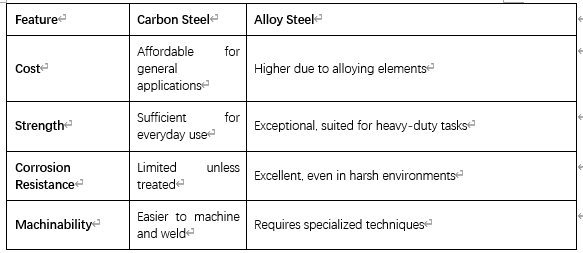In this blog we’ll explore alloy steel and carbon steel, focusing on key considerations like carbon in low carbon steel, the different types of carbon steels, and the comparison of alloy steel vs. carbon steel to help you make an informed decision.
Types of Carbon Steel
Low Carbon Steel: Containing less than 0.3% carbon, low carbon steel is valued for its high ductility, ease of welding, and affordability. These qualities make it an excellent choice for structural components, pipelines, and automotive body parts, where flexibility and cost-effectiveness are essential.
Medium Carbon Steel: With a carbon content of 0.3% to 0.6%, medium carbon steel offers a balance of strength and flexibility. Its properties make it ideal for manufacturing components such as gears, axles, and railways, where moderate strength and durability are needed.
High Carbon Steel: Containing between 0.6% and 1.0% carbon, high carbon steel provides exceptional hardness and wear resistance. This makes it particularly suited for cutting tools, springs, and high-strength wires, where durability and resilience are critical.
The role of carbon in low carbon steel is particularly important, as its lower carbon content allows for easier shaping and machining. These attributes make it highly versatile and ideal for general construction and manufacturing needs.
What is Alloy Steel?
Alloy steel incorporates additional elements such as chromium, molybdenum, vanadium, and nickel, which enhance its strength, hardness, and resistance to corrosion. These characteristics make alloy steel a preferred material for demanding applications across various industries.
Low-Alloy Steel: Featuring less than 8% alloying elements, low-alloy steel strikes a balance between cost and performance, making it suitable for structural and mechanical uses.
High-Alloy Steel: With higher concentrations of alloying elements, such as chromium, high-alloy steel exhibits superior corrosion resistance and strength, making it ideal for applications like stainless steel production.
The unique properties of alloy steel, including its superior yield and tensile strength, outstanding resistance to rust and oxidation, and durability in heavy-duty applications, make it an invaluable choice for projects requiring exceptional performance.
Alloy Steel vs. Carbon Steel: What’s the Difference?
Choosing between alloy steel vs. carbon steel depends on your project’s specific requirements. Here’s a side-by-side comparison:

Both alloy steel and carbon steel offer distinct advantages depending on your application. For projects requiring high performance in challenging conditions, alloy steel is the better choice. Meanwhile, carbon steels remain indispensable for basic construction and low-stress applications.
Applications of Alloy and Carbon Steels
Construction:
Carbon steels, especially low carbon variants, are commonly used in frameworks, pipelines, and reinforcing bars.
Alloy steel is ideal for bridges, high-rise buildings, and structural components needing extra strength.
Energy Sector:
Alloy steel is critical for pipelines, turbines, and equipment exposed to extreme temperatures or corrosive environments.
Tool Manufacturing:
High carbon steel is used for knives, tools, and cutting equipment.
Alloy steel is perfect for industrial machinery and components needing high durability.
Automotive Industry:
Low carbon steel is used for body panels and support structures.
Alloy steel provides the strength required for drivetrain components like axles and gears.
Why Choose Qianhao for Your Steel Needs?
Qianhao engineering team understands the importance of selecting the right material for your project. Our expertise spans the full range of carbon steels and alloy steels, ensuring we can recommend the best solution for your needs. Whether you need the affordability of low carbon steel or the advanced performance of high-strength alloy steel, our team is here to assist.
By staying at the forefront of steel technology and applications, we pride ourselves on providing industry-leading knowledge and materials to help you choose the best steel for your applications Qianhao is your trusted partner for quality materials and expert advice. We are happy to help your business thrive with tailored steel solutions.